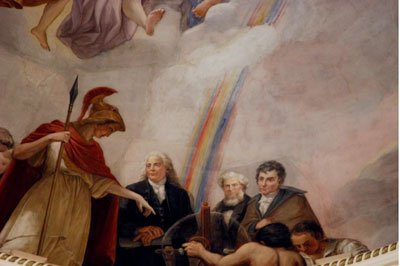GFP Note: We are presenting this video
for your awareness and enjoyment.
As always, please use your discernment.







Published on Dec 14, 2012 by DiscloseTruthTV

Minerva with Benjamin Franklin at the end of the rainbow.
Photo: Wm. Henry
George Noory welcomed investigative mythologist William Henry, who discussed his latest research into the esoteric symbolism of the U.S. Capitol and what it reveals about the intentions of the founding fathers. Describing the insights he has gained from his investigation, Henry said, "when you start to look into this and you peel back the layers of the symbolism of the Capitol, you're like 'wait a minute, what is going on here?'"
According to him, the symbolism found in the Capitol Building suggests that it is both the center of our federal government and an esoteric temple (see images). While such a concept may sound arcane to some, Henry pointed out that throughout history the building has been referred to as a "temple" by prominent statesmen, dating back to when it was first being built all the way up to contemporary times. He also listed a litany of features which "unquestionably identify it as a temple," including "stone construction, an underground entrance, chapels ... closed doors, private members, and an orientation to the sun."
Based on his research, Henry surmised that the ultimate purpose of the Capitol as a temple is to deify George Washington. He presented many clues which led him to this conclusion, most notably the striking similarities between a fresco of Washington on the ceiling of the Capitol dome and traditional depictions of Jesus. "The message is crystal clear," he said, "George Washington is the American Christ ... and this is his temple." Rather than ascribe sinister connotations to this deification of Washington, Henry saw it more as a celebration of the transformation of man into God, which he believes is attainable by everyone. Later in the evening, Henry talked about 2012 as well as his research into star gates.
Biography:
William Henry is an investigative mythologist and author of ten books on ancient mythology and neo-archaeology with a Stargate twist. By applying the latest theories in science and consciousness to ancient myths of the gates of the illumined gods, including Sumerian, Egyptian and Holy Grail gateway myths, he hopes to uncover the secrets of the guarded, by such groups as the Illuminati. His latest book, Oracle of the Illuminati, states that we are on the verge of rediscovering the sacred science of creating peace on Earth.
Wikipedia
Esotericism or Esoterism signifies the holding of esoteric opinions or beliefs, that is, ideas preserved or understood by a small group or those specially initiated, or of rare or unusual interest. The term derives from the Greek ἐσωτερικός (esôterikos), a compound of ἔσω (esô): "within", thus "pertaining to the more inward", mystic. Its antonym is "exoteric".
The term can also refer to the academic study of esoteric religious movements and philosophies, or more generally of alternative or marginalized religious movements or philosophies whose proponents distinguish their beliefs, practices, and experiences from mainstream institutionalized traditions.
Examples of esoteric religious movements and philosophies include Alchemy, Astrology, Anthroposophy, early Christian mysticism, Gnosticism, Magic, Mesmerism, Rosicrucianism, Taoism, Swedenborgianism, Spiritualism, the Alawites, the Christian Theosophy of Jacob Böhme and his followers, and the Theosophical currents associated with Helena Blavatsky and her followers. There are competing views regarding the common traits uniting these currents, not all of which involve "inwardness", mystery, occultism or secrecy as a crucial trait.
History
Since esotericism is not a single tradition but a vast array of often unrelated figures and movements, there is no single historical thread underlying them all.[12] The developments that one might wish to emphasize in drawing up a history of esotericism furthermore depends on whether esotericism in the dictionary (non-scholarly) or the scholarly sense is intended.
Several historically attested religions emphasize secret or hidden knowledge, and are thus esoteric in the dictionary sense, without necessarily being esoteric movements in the scholarly sense of the word. Thus, the Roman Empire had several mystery religions which emphasized initiation. Some saw Christianity, with its ritual of baptism, as a mystery religion. None of these are "esoteric" in the scholarly sense. The terms "Gnosticism" and "Gnosis" refer to a family of religious movements which claimed to possess secret knowledge (gnosis).
Western esoteric movements in the scholarly sense thus have roots in Antiquity and the Middle Ages. A major phase in the development of Western esotericism begins in the Renaissance, partly as the result of various attempts to revive such earlier movements. During the Italian Renaissance, for example, translators such as Ficino and Pico della Mirandola turned their attention to the classical literature of Neoplatonism, and what was thought to be the pre-Mosaic tradition of Hermeticism.

